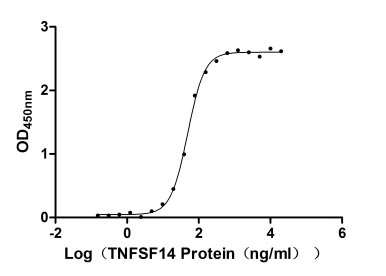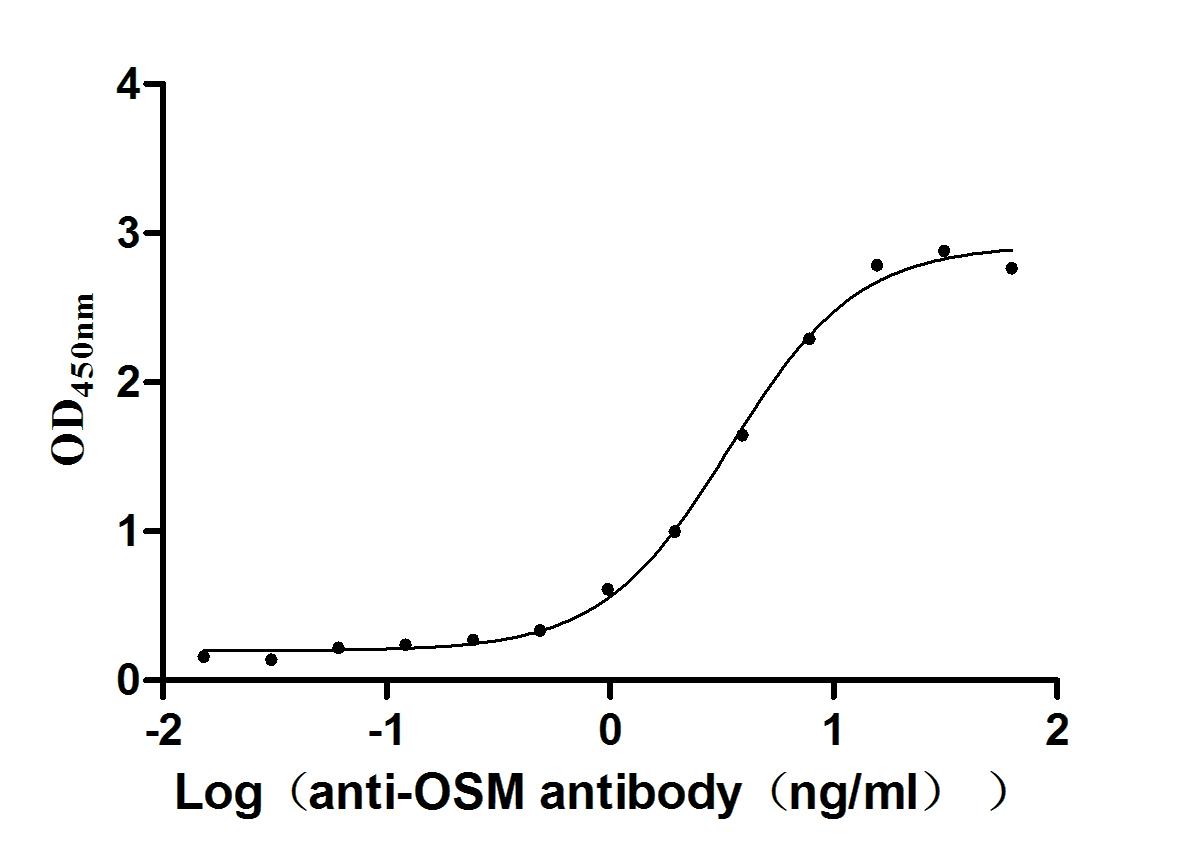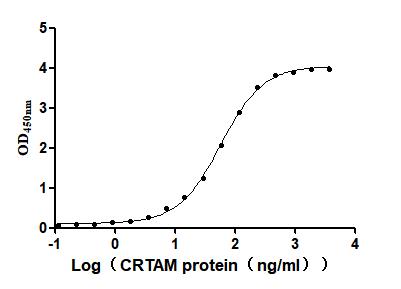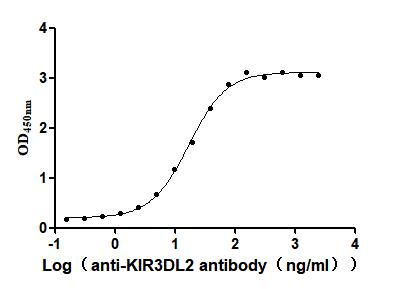Recombinant Mouse T-cell leukemia/lymphoma protein 1A (Tcl1a)
-
中文名称:小鼠Tcl1a重组蛋白
-
货号:CSB-YP023313MO
-
规格:
-
来源:Yeast
-
其他:
-
中文名称:小鼠Tcl1a重组蛋白
-
货号:CSB-EP023313MO-B
-
规格:
-
来源:E.coli
-
共轭:Avi-tag Biotinylated
E. coli biotin ligase (BirA) is highly specific in covalently attaching biotin to the 15 amino acid AviTag peptide. This recombinant protein was biotinylated in vivo by AviTag-BirA technology, which method is BriA catalyzes amide linkage between the biotin and the specific lysine of the AviTag.
-
其他:
-
中文名称:小鼠Tcl1a重组蛋白
-
货号:CSB-BP023313MO
-
规格:
-
来源:Baculovirus
-
其他:
-
中文名称:小鼠Tcl1a重组蛋白
-
货号:CSB-MP023313MO
-
规格:
-
来源:Mammalian cell
-
其他:
产品详情
-
纯度:>85% (SDS-PAGE)
-
基因名:
-
Uniprot No.:
-
别名:Tcl1a; Tcl1; T-cell leukemia/lymphoma protein 1A; Oncogene TCL-1; Oncogene TCL1; Protein p14 TCL1
-
种属:Mus musculus (Mouse)
-
蛋白长度:Full length protein
-
表达区域:1-116
-
氨基酸序列MATQRAHRAETPAHPNRLWIWEKHVYLDEFRRSWLPVVIKSNEKFQVILRQEDVTLGEAM SPSQLVPYELPLMWQLYPKDRYRSCDSMYWQILYHIKFRDVEDMLLELIDSESNDE
-
蛋白标签:Tag type will be determined during the manufacturing process.
The tag type will be determined during production process. If you have specified tag type, please tell us and we will develop the specified tag preferentially. -
产品提供形式:Lyophilized powder
Note: We will preferentially ship the format that we have in stock, however, if you have any special requirement for the format, please remark your requirement when placing the order, we will prepare according to your demand. -
复溶:We recommend that this vial be briefly centrifuged prior to opening to bring the contents to the bottom. Please reconstitute protein in deionized sterile water to a concentration of 0.1-1.0 mg/mL.We recommend to add 5-50% of glycerol (final concentration) and aliquot for long-term storage at -20℃/-80℃. Our default final concentration of glycerol is 50%. Customers could use it as reference.
-
储存条件:Store at -20°C/-80°C upon receipt, aliquoting is necessary for mutiple use. Avoid repeated freeze-thaw cycles.
-
保质期:The shelf life is related to many factors, storage state, buffer ingredients, storage temperature and the stability of the protein itself.
Generally, the shelf life of liquid form is 6 months at -20°C/-80°C. The shelf life of lyophilized form is 12 months at -20°C/-80°C. -
货期:Delivery time may differ from different purchasing way or location, please kindly consult your local distributors for specific delivery time.Note: All of our proteins are default shipped with normal blue ice packs, if you request to ship with dry ice, please communicate with us in advance and extra fees will be charged.
-
注意事项:Repeated freezing and thawing is not recommended. Store working aliquots at 4°C for up to one week.
-
Datasheet :Please contact us to get it.
相关产品
靶点详情
-
功能:Enhances the phosphorylation and activation of AKT1 and AKT2. Enhances cell proliferation, stabilizes mitochondrial membrane potential and promotes cell survival.
-
基因功能参考文献:
- acalabrutinib showed increased BTK selectivity compared with ibrutinib while demonstrating significant antitumor efficacy in vivo on par with ibrutinib. Similarly, in the TCL1 adoptive transfer model, decreased phosphorylation of BTK, PLCgamma2, and S6 was observed. Most notably, treatment with acalabrutinib resulted in a significant increase in survival compared with mice receiving vehicle PMID: 27903679
- suggests that in the TCL1-tg mouse, main tumor support may not be derived from CD4+ T cells, but from the monocytic population PMID: 26522084
- we revealed that one of the key functions of KLF4-induced TCL1 during reprogramming is to promote the metabolic shift from oxidative phosphorylation to glycolysis. PMID: 28262547
- results indicate that decreased Cav-1 in Emu-TCL1 mice significantly delays the onset of CLL and decreases leukemic progression by inhibiting MAPK-Erk signaling, suggesting a role for Cav-1 in the proliferation and progression of CLL PMID: 26435347
- This review discusses the main features of the original TCL1 models and the different lines of research successively developed with particular attention to genetically compound mice and the therapeutic applications in drug development. PMID: 25700368
- Tcl1 expression downregulated a distinct group of genes, including Ndp52, whose expression is very high in blastocysts but reduced in the primitive ectoderm. PMID: 23940776
- Data indicate that APRIL expression accelerates the onset of TCL1-driven leukemia formation mainly through TACI activation. PMID: 24100449
- These findings demonstrate cooperation of Tcl1 and the NF-kB pathway in the pathogenesis of aggressive chronic lymphocytic leukemia. PMID: 23591791
- An important role of TCL1 in activating the ER stress response in support for malignant progression of chronic lymphocytic leukemia. PMID: 22692508
- TCL1 and/or other genes in the TCL1 pathway are responsible for the initiation of human chronic lymphocytic leukemia. PMID: 12011454
- role in early embryonic development and overexpression in human seminomas PMID: 12181493
- Akt kinase activity can be inhibited by a peptide spanning the betaA strand of the proto-oncogene TCL1 PMID: 15459205
- Tcl1 is a coactivator of Akt signaling, in normal T- and B-cell development and function. PMID: 15479728
- Detailed mechanism for TCL1-augmented signaling helps explain the delayed occurrence of mature T cell expansions and leukemias despite tumorigenic TCL1 dysregulation that begins in early thymocytes. PMID: 16002684
- findings indicate that other oncogenic mechanism(s) may be involved in the development of solid tumors in Emu-TCL1 transgenic mice PMID: 16424025
- TCL1 transgenic B cells primed for transformation must experience the germinal center environment and, for at least some, develop genome instability to become fully malignant. PMID: 16728701
- Data indicate that the immunoglobulin heavy and light chain rearrangements in TCL1 mice display minimal levels of somatic mutations and exhibit several molecular features found in the human disease. PMID: 16864779
- early mouse embryos display a physiological dissociation between TCL1 functions of AKT phosphorylation and phosphorylated AKT transfer to nucleus PMID: 17901877
- a ternary complex of TCL1, Epac1, and Akt forms in activated macrophages both promoting Akt activation and regulating intracellular distribution of Akt PMID: 17993260
- Tcl1 gene(s) might have important roles in hair formation, by its involvement in cycling and self-renewal of transient amplifying (TA) and stem-cell (SC) populations. PMID: 19169282
- infusion of chronic lymphocytic leukemia cells into young Emu-TCL1 mice induced defects comparable to those seen in mice with developed leukemia, demonstrating a causal relationship between leukemia and the T-cell defects PMID: 19332800
显示更多
收起更多
-
亚细胞定位:Cytoplasm. Nucleus. Microsome. Endoplasmic reticulum.
-
蛋白家族:TCL1 family
-
数据库链接:
KEGG: mmu:21432
STRING: 10090.ENSMUSP00000036066
UniGene: Mm.18154
Most popular with customers
-
Recombinant Human Tumor necrosis factor ligand superfamily member 14 (TNFSF14), partial (Active)
Express system: Mammalian cell
Species: Homo sapiens (Human)
-
Recombinant Human HLA class II histocompatibility antigen gamma chain (CD74), partial (Active)
Express system: Mammalian cell
Species: Homo sapiens (Human)
-
Recombinant Human Claudin-6 (CLDN6)-VLPs (Active)
Express system: Mammalian cell
Species: Homo sapiens (Human)
-
Recombinant Human Oncostatin-M (OSM), partial (Active)
Express system: Mammalian cell
Species: Homo sapiens (Human)
-
Recombinant Mouse Cytotoxic and regulatory T-cell molecule (Crtam), partial (Active)
Express system: Mammalian cell
Species: Mus musculus (Mouse)
-
Recombinant Human Killer cell immunoglobulin-like receptor 3DL2 (KIR3DL2), partial (Active)
Express system: Mammalian cell
Species: Homo sapiens (Human)



-AC1.jpg)
-AC1.jpg)













